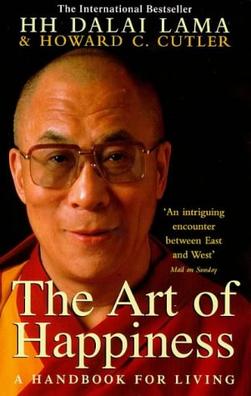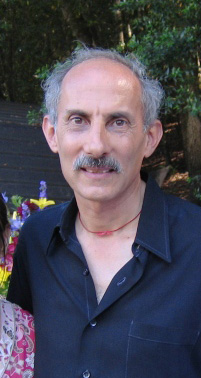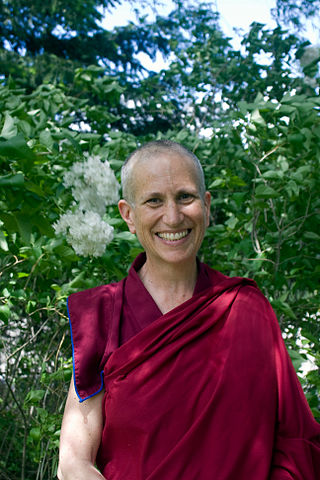
The Gelug is the newest of the four major schools of Tibetan Buddhism. It was founded by Je Tsongkhapa (1357–1419), a Tibetan philosopher, tantric yogi and lama and further expanded and developed by his disciples.
The relationship between Buddhism and science is a subject of contemporary discussion and debate among Buddhists, scientists, and scholars of Buddhism. Historically, Buddhism encompasses many types of beliefs, traditions and practices, so it is difficult to assert any single "Buddhism" in relation to science. Similarly, the issue of what "science" refers to remains a subject of debate, and there is no single view on this issue. Those who compare science with Buddhism may use "science" to refer to "a method of sober and rational investigation" or may refer to specific scientific theories, methods or technologies.

Compassion is a social feeling that motivates people to go out of their way to relieve the physical, mental, or emotional pains of others and themselves. Compassion is sensitivity to the emotional aspects of the suffering of others. When based on notions such as fairness, justice, and interdependence, it may be considered partially rational in nature.
Karuṇā is generally translated as compassion or mercy and sometimes as self-compassion or spiritual longing. It is a significant spiritual concept in the Indic religions of Hinduism, Buddhism, Sikhism, and Jainism.

In Mahayana Buddhism, bodhicitta,, is the mind (citta) that is aimed at awakening (bodhi), with wisdom and compassion for the benefit of all sentient beings. Bodhicitta is the defining quality of the Mahayana bodhisattva and the act of giving rise to bodhicitta (bodhicittotpāda) is what makes a bodhisattva a bodhisattva. The Daśabhūmika Sūtra explains that the arising of bodhicitta is the first step in the bodhisattva's career.

The Art of Happiness is a book by the 14th Dalai Lama and Howard Cutler, a psychiatrist who posed questions to the Dalai Lama. Cutler quotes the Dalai Lama at length, providing context and describing some details of the settings in which the interviews took place, as well as adding his own reflections on issues raised.
Lamrim is a Tibetan Buddhist textual form for presenting the stages in the complete path to enlightenment as taught by Buddha. In Tibetan Buddhist history there have been many different versions of lamrim, presented by different teachers of the Nyingma, Kagyu and Gelug schools. However, all versions of the lamrim are elaborations of Atiśa's 11th-century root text A Lamp for the Path to Enlightenment (Bodhipathapradīpa).

Linda Pritzker also known by the name Lama Tsomo is an American lama in the Tibetan Buddhist tradition. She is a spiritual teacher, author, philanthropist, and co-founder of the Namchak Foundation and Namchak Retreat Ranch in Missoula, Montana. She is a member of the Pritzker family, known for the Hyatt Hotel fortune.

Jack Kornfield is an American writer and teacher in the Vipassana movement in American Theravada Buddhism. He trained as a Buddhist monk in Thailand, Burma and India, first as a student of the Thai forest master Ajahn Chah and Mahasi Sayadaw of Burma. He has taught mindfulness meditation worldwide since 1974. In 1975, he co-founded the Insight Meditation Society in Barre, Massachusetts, with Sharon Salzberg and Joseph Goldstein, and subsequently in 1987, Spirit Rock Meditation Center in Woodacre, California. Kornfield has worked as a peacemaker and activist, organized teacher training, and led international gatherings of Buddhist teachers including the Dalai Lama.

Matthieu Ricard is a Nepalese French writer, photographer, translator and Buddhist monk who resides at Shechen Tennyi Dargyeling Monastery in Nepal.
Tonglen is Tibetan for 'giving and taking', and refers to a meditation practice found in Tibetan Buddhism.
Lojong is a contemplative practice in the Tibetan Buddhist tradition which makes use of various lists of aphorisms or slogans which are used for contemplative practice. The practice involves refining and purifying one's motivations and attitudes. There are various sets of lojong aphorisms; the most widespread text in the Sarma traditions is that of Chekawa Yeshe Dorje. There is also another set of eight lojong slogans by Langri Tangpa. In the Nyingma tradition, there is a list of seven lojong slogans which are part of the Dzogchen Nyingthig lineage.

Thubten Chodron, born Cheryl Greene, is an American Tibetan Buddhist nun, author, teacher, and the founder and abbess of Sravasti Abbey, the only Tibetan Buddhist training monastery for Western nuns and monks in the United States. Chodron is a central figure in the reinstatement of the Bhikshuni ordination of women. She is a student of the 14th Dalai Lama, Tsenzhab Serkong Rinpoche, Lama Thubten Yeshe, Thubten Zopa Rinpoche, and other Tibetan masters. She has published many books on Buddhist philosophy and meditation, and is co-authoring with the Dalai Lama a multi-volume series of teachings on the Buddhist path, The Library of Wisdom and Compassion.

Buddhism includes an analysis of human psychology, emotion, cognition, behavior and motivation along with therapeutic practices. Buddhist psychology is embedded within the greater Buddhist ethical and philosophical system, and its psychological terminology is colored by ethical overtones. Buddhist psychology has two therapeutic goals: the healthy and virtuous life of a householder and the ultimate goal of nirvana, the total cessation of dissatisfaction and suffering (dukkha).

The 14th Dalai Lama is, as the incumbent Dalai Lama, the highest spiritual leader and head of Tibetan Buddhism. Before 1959, he served as both the spiritual and temporal leader of Tibet and subsequently established and led the Tibetan government in exile in India. By the adherents of Tibetan Buddhism, he is considered a living Bodhisattva, an emanation of Avalokiteśvara in Sanskrit, and Chenrezig in Tibetan. The Dalai Lama, whose name means "Ocean of Wisdom," is known to Tibetans as Gyalwa Rinpoche, "The Precious Jewel-like Buddha-Master," Kundun, "The Presence," and Yizhin Norbu, "The Wish-Fulfilling Gem." His devotees, as well as much of the Western world, often call him His Holiness the Dalai Lama, the style employed on his website. He is also the leader and a monk of the Gelug school, the newest school of Tibetan Buddhism, formally headed by the Ganden Tripa.
In the Buddha's first discourse, he identifies craving (tanha) as the cause of suffering (dukkha). He then identifies three objects of craving: the craving for existence; the craving for non-existence and the craving for sense pleasures (kama). Kama is identified as one of five hindrances to the attainment of jhana according to the Buddha's teaching. Throughout the Sutta Pitaka the Buddha often compares sexual pleasure to arrows or darts. So in the Kama Sutta (4.1) from the Sutta Nipata the Buddha explains that craving sexual pleasure is a cause of suffering.
If one, longing for sensual pleasure, achieves it, yes, he's enraptured at heart. The mortal gets what he wants. But if for that person — longing, desiring — the pleasures diminish, he's shattered, as if shot with an arrow.
The Dalai Lama Center for Peace and Education is an international charitable organization and education center in Vancouver, British Columbia, Canada. Established in 2005, the center's mission is to "educate the hearts of children by informing, inspiring, and engaging the communities around them."

The Happiness Hypothesis: Finding Modern Truth in Ancient Wisdom is a 2006 book written by American social psychologist Jonathan Haidt. In it, Haidt poses several "Great Ideas" on happiness espoused by thinkers of the past—such as Plato, Buddha and Jesus—and examines them in the light of contemporary psychological research, extracting from them any lessons that still apply to our modern lives. Central to the book are the concepts of virtue, happiness, fulfillment, and meaning.
The philosophy of happiness is the philosophical concern with the existence, nature, and attainment of happiness. Some philosophers believe happiness can be understood as the moral goal of life or as an aspect of chance; indeed, in most European languages the term happiness is synonymous with luck. Thus, philosophers usually explicate on happiness as either a state of mind, or a life that goes well for the person leading it. Given the pragmatic concern for the attainment of happiness, research in psychology has guided many modern-day philosophers in developing their theories.
Kelly McGonigal is a health psychologist and lecturer at Stanford University who is known for her work in the field of "science help" which focuses on translating insights from psychology and neuroscience into practical strategies that support health and well-being. Mainstream media articles about inner-conflict-related aspects of modern lifestyles regularly quote her. A longtime advocate of self-compassion and mindfulness as stress-coping strategies, McGonigal has altered her focus on the problematic aspects of stress; in a talk at the TEDGlobal 2013, she emphasized the importance of an individual's subjective belief in themselves as someone who is able to cope successfully as being a crucial factor in their actual response to stress.












